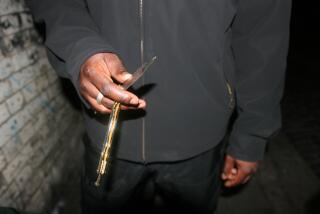Paddling Is Constitutional, Lungren Says : Crime: Attorney general’s legal opinion gives boost to efforts of Orange assemblyman to deter graffiti vandals.
SACRAMENTO — Giving a boost to an Orange County lawmaker’s efforts to allow the paddling of juvenile graffiti vandals, state Atty. Gen. Dan Lungren has issued a legal opinion concluding that such corporal punishment is constitutional.
In the eight-page opinion obtained by The Times on Friday, Lungren argues that the Legislature would not violate provisions in the U.S. and state constitutions outlawing cruel and unusual punishment if it approved the courtroom paddlings.
Assemblyman Mickey Conroy (R-Orange), who requested the opinion from Lungren in hopes of undercutting key arguments against a pair of paddling bills he is pushing through the Legislature, said the opinion validates his long-held belief that the punishment isn’t excessive or unconstitutional.
“It’s something I’ve contended all along,” Conroy said. “This just simply shoots down the constitutional question. People misconstrue this as brutalizing a kid, and it isn’t at all.”
But he conceded that Lungren’s legal opinion was just the first step in what remains a long fight to get approval for his legislation.
For this year, Conroy has tabled his two bills, which call for paddling graffiti vandals and allowing paddling to be reintroduced in schools, because Republicans and Democrats are locked in a tug-of-war over control of the Assembly and such conservative measures have been shot down. But with the GOP poised to seize firm control of the lower house next year, Conroy has promised to begin his push anew in 1996.
Even so, Conroy said that opposition from Democrats, and potentially from some Republican moderates, could prove formidable. Moreover, Lungren’s legal opinion aside, the measures would almost certainly be tested in court if they became law.
Conroy has attracted nationwide attention with his push for the paddling legislation. Last year, his bill to allow young graffiti vandals to be whacked up to 10 times with a wooden paddle fell to a narrow defeat in its final committee test before reaching the Assembly floor.
Opponents of paddling have long maintained that it not only is cruel and unusual punishment forbidden by the state and federal constitutions, but also a wrongheaded method for meting out discipline to errant youths.
They cite studies that suggest paddling and other forms of corporal punishment leave impressionable teen-agers shell-shocked and battered, instilling them with a violent nature instead of weaning them from violent behavior.
But the opinion by Lungren suggests that paddling performed in a courtroom under the supervision of a judge, as called for in Conroy’s measure, could be sufficiently controlled to ensure that the punishment is appropriate to the crime.
Although court rulings have banned corporal punishment in prisons, saying it is cruel and unusual, paddling is allowed in schools in dozens of states. Lungren draws a parallel between the courtroom and the classroom.
He noted that the paddling would be administered “under a judge’s supervision by or in the presence of the juvenile’s parents.” In addition, there would be other witnesses and little chance of “arbitrary actions” that can occur in prison settings.
“Indeed, the courtroom setting would afford certain protections not found even in a school setting,” Lungren wrote.
Approval by the Legislature would be a sufficient test to determine that paddling is “an appropriate sanction for the crime committed and that other forms of punishment have not been effective in curbing graffiti vandalism by minors,” Lungren said in the opinion.
Lungren also suggested that the Legislature has discretion under the state Constitution to determine both the degree and method of punishment.
“As conditions of modern society change, it may become necessary to utilize a different type of punishment in response to a particular crime,” Lungren said in the opinion. The state Constitution “does not deprive the Legislature of flexibility in fashioning the appropriate response to criminal behavior.”
More to Read
Sign up for Essential California
The most important California stories and recommendations in your inbox every morning.
You may occasionally receive promotional content from the Los Angeles Times.









